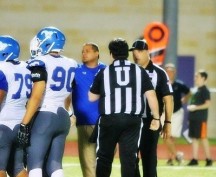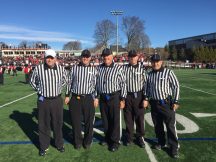
Jack Walsh, an ANEFO member, was recently interviewed by The Boston Globe regarding the assault on a Texas high school football umpire. His comments appeared in the article titled “For Local Referees, Incident in Texas Hits Close to Home,” The Boston Globe, September 27, 2015. Kevin Paul Dupont, Globe staff reporter, commented:
Jack Walsh, a referee at high school football games in Eastern Mass. for more than 25 years, labeled the Texas incident “very disturbing.’’
“Because we are out there and vulnerable in a situation like that,’’ added Walsh, 61. “But I have never seen anything in this area close to that… nothing like it whatsoever. I hope it’s an isolated case.’’
To read the article, see below or go to:
https://www.bostonglobe.com/sports/2015/09/26/local-high-school-officials-react-texas-incident/fphFfLr4sVrSWiwjLwdmzN/story.html
THE ARTICLE
Chris Gregory has officiated high school football for more than 20 years, much of it in Eastern Massachusetts. Not surprisingly, he was disturbed when he saw the video of two high school players in Texas earlier this month brutally hitting an unsuspecting on-field official during a game — hits that both players later said were delivered on a coach’s orders.
“This is the ‘Oh, my God’ moment,’’ said Gregory, 50, noting that he was intentionally hit by a player years ago, requiring him to undergo shoulder surgery. “It makes me wonder, what are we teaching our kids?”
The incident in Marble Falls, Texas, viewed on YouTube nearly 11 million times, left umpire Robert Watts, a 14-year officiating veteran, with a concussion. Both players were suspended from John Jay High School in San Antonio. Mack Breed, an assistant coach, promptly was placed on administrative leave, amid accusations that he instructed the players to hit the official.
Gregory, one of a number of local on-field officials and head coaches interviewed by the Globe, expressed outrage and disappointment over the attack on Watts. Other than Gregory, none of the officials said they were ever the targets of deliberate hits, and no one interviewed felt such action was commonplace here. None said they felt the incident in Texas would lead to changes in policy or how games will be officiated in the future.
“The circumstances in the Texas game sound special,’’ said Brad Farrington, 59, who has officiated high school football and other sports for more than 25 years. “Now, I will say, there are games you’ll work where there’s some tension, either the crowd has been incited by something or the players themselves are incited. As an official, your radar is up in instances like that. Now, with what has happened in Texas, I might be more acutely aware.”
As for reporting to duty on the gridiron for future high school games, added Farrington, “I wouldn’t give a thought to’’ what happened in Texas.
Dennis Donovan, an on-field official for 25 years and an officials’ representative for the Massachusetts Interscholastic Athletic Association, estimated some 700 on-field officials are certified to work high school games in Eastern Mass., all paid $85 per game.
“I can’t recall anything like it,’’ said Donovan, noting that he was “appalled’’ by the deliberate attack on Watts. “I have seen players get agitated with calls. But I have never seen it get physical.’’
Two weeks after the Sept. 4 incident in Texas, the two players, sophomore Victor Rojas and senior Mike Moreno, said during a “Good Morning America’’ interview that Breed ordered them to deliver their hits.
According to Moreno, who delivered the second blow with Watts already felled by Rojas, it was Breed who instructed the players, “You need to hit the ref. He needs to pay the price.’’ Later in the interview, Moreno added, “You put your trust in this grown-up, this guardian, your coach . . . I did what I was told.’’
Rojas and Moreno, no longer playing football, have resumed classes at a juvenile justice school in the San Antonio area. Breed was placed on administrative leave and resigned his position on Thursday. Watts, accused by John Jay players of using racial epithets toward them before and after their hits, has not commented publicly. Via his attorney, he has denied using racially charged words.
National attention
Winslow Townson for The Boston Globe
Chris Gregory has been officiating games for 20 years.
Gregory, who began his officiating career in California, declined to identify the player he believes hit him intentionally. It was “a few years’’ ago, he said, and unlike the Texas incident, there was no video of the hit.
“I have no proof that it was on purpose,’’ said Gregory. But he remains convinced that it was intentional.
Like Watts, Gregory that day was lined up in the umpire’s position on the field, a few yards behind the defensive line, near the linebackers and with the cornerbacks behind him. In Watts’s case, he was first drilled by Rojas, the cornerback who lined him up with a running start of some 20 feet from the left. Moreno, the opposite cornerback, followed by diving helmet-first into the fallen official. In Gregory’s case, it was a linebacker who smacked him.
“I was going to my left, monitoring the play,’’ recalled Gregory, whose wife, Kim, has been an on-field official, as line judge, for nearly 15 years. “There would have been no reason for him to go through me. We get knocked around once in a while. If I misread the play, then I get bumped. If that’s the case, my fault, I deserve to get hit.’’
As in Watts’s case, according to Gregory, the player blasted him from a blind side, with none of the on-field action directly relatable to the contact. Gregory was left with a damaged rotator cuff that required surgery.
“We had a very quick and very meaningful [verbal] exchange,’’ recalled Gregory, reluctant to share much of the “very unfavorable’’ language he used in dressing down the player. “Oh, it was blunt. He was left with no misconception of what I thought the situation was.’’
The player’s reaction?
“Shock and awe,’’ said Gregory. “No doubt, there was shock and awe.’’
In the Texas game, two players were immediately ejected for the hits on Watts. Rojas was thrown out, but the crew errantly tossed another player, mistaking him for Moreno.
According to Gregory, the player who assaulted him years ago remained in the game.
“Again, you have to have proof, and there wasn’t any,’’ said Gregory, noting the absence of video and that the hit was not witnessed by other crew members. “But he knew what he did. And I knew I had to let him know how life was.’’
Barry Mano, founder and president of the National Association of Sports Officials, said he has been astonished by the amount of national attention the incident in Marble Falls has received. While appalled by the act, and concerned for Watts, a NASO member, Mano noted that two soccer referees have been killed as a result of working games in the United States in the last 2-3 years, and in neither case did their deaths receive similar media coverage or national scrutiny.
“You would think, common-sensically, that the two deaths would have been well beyond what we’ve seen in this case, right?’’ said Mano, 72, who is also the publisher of “Referee” magazine, a trade journal for the officiating industry. “It was huge, but not like this . . . this has been just amazing.’’
In April 2013, Ricardo Portillo, 46, was punched in the face by a 17-year-old player while he refereed a soccer game in an Hispanic youth league in the Salt Lake City suburbs. Portillo died seven days later and his assailant, who pleaded guilty to homicide by assault, was sentenced to a three-year jail term.
In June 2014, referee John Bieniewicz, 44, was killed when he was similarly slugged in a soccer game in Livonia, Mich. Bieniewicz was in the process of serving a red card on Bassel Saad, age 36, when the incensed player punched him in the face. Bieniewicz died two days later, and Saad this spring was sentenced to 8-15 years, his initial murder charge reduced to manslaughter. “Mr Saad murdered my husband,’’ Kris Bieniewicz said the day of Saad’s sentencing.
“I am not going to call it a trend,’’ said Mano, his NASO with some 22,000 dues-paying members. “To call it a trend would be unfair, connecting dots that I don’t think you can credibly connect. But I will say this, we are hearing more of this in our offices.’’
Case in point, said Mano, is the recorded telephone menu callers hear when they dial NASO offices. Option No. 3 is for those members interested in learning more about insurance and assault cases.
“That says something, doesn’t it?’’ said Mano. “We would not have button No. 3, ‘assaults’ when I started the association in 1980. And we would not have had it in 1990. Maybe we would have had it in 2000. For damn sure, we had that button in 2010, and we’ll have it as we go forward.’’
Jack Walsh, a referee at high school football games in Eastern Mass. for more than 25 years, labeled the Texas incident “very disturbing.’’
“Because we are out there and vulnerable in a situation like that,’’ added Walsh, 61. “But I have never seen anything in this area close to that . . . nothing like it whatsoever. I hope it’s an isolated case.’’
Only a week after the incident in Marble Falls, another player in San Antonio, Zeke Cardenas of St. Anthony High School, pushed an on-field official, earning an instant ejection. While unusual and also captured on video, it was not nearly as egregious as the two-player assault on Watts.
Changes in behavior?
Debee Tlumacki for The Boston Globe
Referees Dennis Donovan (left) and Brad Farrington worked a game between Stoughton and Marshfield last week.
Peter Colombo has coached football for some 30 years, and he has directed the Brockton High program since 2003. Today’s players, he noted, are bigger and stronger and faster, but he has detected no discernible difference in their behavior toward officials over the last three decades.
“We have been playing football in Brockton the same way for a long time,’’ he said. “We pride ourselves on playing tough, hard-nosed football . . . but always clean, and focused on doing it the right way. The same with our opponents and their coaches. We are out here educating the kids, teaching the game, believing it changes kids’ lives.’’
Milton High football coach Steve Dembowski, a veteran of 22 years, said he hasn’t witnessed players being more aggressive with officials, but he has seen their on-field demeanor change, in large part because of TV.
“The kids emulate the college and pro guys,’’ he said. “Over the last, oh, 20 years I’d say, the behaviors of the pros, especially their celebrating on the field, have trickled down. It started with Deion Sanders and [Brian] Bosworth and guys like that, marketing themselves on the field. So I think you see the high school kids doing that a lot more than they should . . . even after a simple catch or simple tackle. They’re getting that from TV. They take that moment to acknowledge themselves instead of getting ready for the next play.”
Kim Gregory, one of the few female on-field football officials in Eastern Mass., denounced the incident in Texas as having no place in sports and “no different than if they attacked the guy on a street corner.’’
She also recalled initially thinking, “Wow, that is really scary, what do I do?’’ when first seeing the YouTube video of the assault on Watts.
“To be honest, though, I’ve been on the field since then, and I feel just fine,’’ said Kim Gregory. “The majority of the kids are good kids. For the most part, I think they take it out on their rivals and not so much on the officials.’’
“We work with incredible athletes here in Massachusetts,’’ agreed her husband, Chris, undeterred from his own assault incident. “And 99.9 percent, and you can carry that point-9 out to infinity . . . are incredibly well coached. They play the right way. They are learning. In the case in Texas, I think you saw two teenagers displaying teenage emotion, and that’s very different than adult emotion. Now, unfortunately, it will affect the rest of their lives.’’

